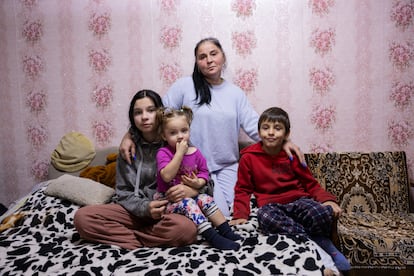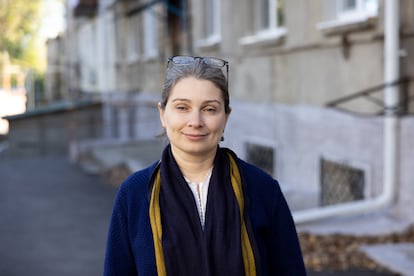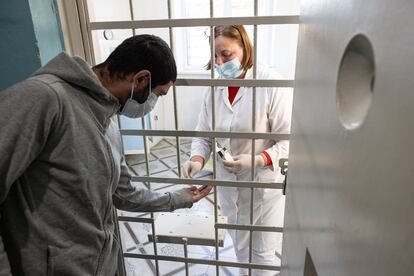In Moldova, women are leading the battle against tuberculosis
The number of patients in this small country who suffer from the infectious disease exceeds 2,000 a year, proportionally seven times more than the European average


When Olga felt so weak and short of breath that she thought that she was going to die, she went directly to Mariana, a nurse from Union for Equity and Health. This NGO provides care to the vulnerable population of the Moldovan city of Bălți, in the north of the country. “I know her and I trust her a lot. I know that, if I’m alive today, it’s thanks to her. Going to a hospital and asking for an X-ray would have been long and expensive,” Olga explains, three years after her tuberculosis diagnosis. Her treatment took more than 24 months. “She suffered from a very aggressive variant, it was destroying her lungs,” explains Mariana, during a follow-up visit with her former patient.
Olga (this report uses only the first names of interviewees, to protect their identities) is 41. She welcomes Mariana and EL PAÍS into her modest home. The walls are painted pink; it’s a neighborhood that’s located in a low-income area of the city. There is a large bed and two reclining sofas where Olga and her five children – the youngest is three, the oldest is 21 – and her two-year-old granddaughter sleep. Their clean clothes are drying. There’s a stove, a rusty refrigerator and a television.
This woman was an employee at a car wash when she started feeling sick. She had barely been able to recover from her recent pregnancy: she was very cold and was working extremely long hours. “When they admitted me to the hospital, my fear was that they would take my children away from me. [My kids] only have me. [In the end], a friend took care of them for me,” she sighs. Her ex-husband lives abroad, while her second husband passed away.
The NGO where Mariana works provided Olga with support during her hospitalization, made sure she completed her treatment at home, helped her obtain social assistance and, to this day, continues to make sure that she attends her necessary medical check-ups.
Tuberculosis – an infectious disease that can be prevented and cured, but is fatal if left untreated – remains one of the priority public health issues in Moldova. Last year, 2,121 new cases were registered in the country. That is, 70.6 per 100,000 inhabitants, a very high figure compared to the European average of 10 cases per 100,000 inhabitants.
However, Moldova – a country with a population of 3.3 million, where one in four citizens lives beneath the poverty line – has made significant progress in eradicating tuberculosis, which affected about 130 citizens per every 100,000 around 20 years ago. A national plan that covers prevention and treatment, door-to-door work done by NGOs to identify patients and ensure that they complete their treatment, as well as significant external funding – especially from the Global Fund – are behind this gradual decline in the pathology.
While visiting public institutions, hospitals, NGOs and even a clinic in a prison, it’s quite clear that the battle being waged against this infectious disease in Moldova is, essentially, being led by women. When this is pointed out to her, Mariana laughs. “It’s true. [There are] many women in this fight.”
The fear of getting sick again
Olga and her family receive a government subsidy of 4,000 lei per month ($250) for childcare. This ends in two months, when the little girl turns four. “We’re rationing food because I don’t know what’s going to happen. I want to work, but I’m afraid of falling ill again and, furthermore, the fact that I’ve had tuberculosis means that there are people who don’t want to hire me,” she laments, while searching through her purse for the official document which certifies that her treatment has ended and that she’s fully recovered. “But this is of no use… people distance themselves and they also discriminate against my children and isolate them.”
Mariana comforts her and pampers the little ones. The Moldovan authorities recognize that a dozen NGOs – like the one that Mariana works with – are essential to reaching members of the society who are at risk. According to figures provided to this newspaper by medical officials and civil society organizations, between 8% and 12% of all tuberculosis cases are identified by these humanitarian groups.
On a Tuesday morning in November, Diniz, a 40-year-old taxi driver, makes another visit to the offices of the Society of Moldova against Tuberculosis (SMIT), in Bălți. This organization was created in 2010 by Oxana Rucsineanu and her husband, Pavel, after both of them recovered from tuberculosis. “I want to get my truck and bus driving license,” Diniz sighs, “but [the authorities] prevent me from doing so because I’ve been sick, even though I’ve finished my treatment and I’m in perfect health.”
“If Diniz doesn’t represent a danger to anyone, this action is illegal. He should have the right to drive a bus. Our lawyer is explaining all this to those who made the decision,” Rucsineanu affirms.

The 45-year-old former teacher contracted tuberculosis back in 2007. It was a drug-resistant variant. “There weren’t many options. They gave me basic treatment. In 2008, other treatments began to enter Moldova. I took them for two years and, thanks to them, I was cured,” she explains, although she wasn’t able to work for three years due to lingering health issues: she had difficulty focusing her eyes, dizziness and fatigue when walking a lot. Even today, she still struggles.
According to Dr. Valentina Vilc, coordinator of the National Tuberculosis Program of Moldova, cases of multidrug-resistant tuberculosis (which represent about 28% of all new annual cases) are a big threat to the country. Furthermore, she estimates that there are “about 300 cases” a year that aren’t detected.
“This isn’t a disease only for the poor, it can affect anyone,” the doctor emphasizes. She speaks to EL PAÍS from the main hospital in the city of Chișinău, where there’s a wing dedicated to patients with tuberculosis. At the beginning of November, there were about 40 patients being treated.
Vitali, a young man who has been bedridden at the medical center for weeks, is 18, athletic and, before he fell ill, he was completing his vocational training.”I started coughing last winter and it lasted for months,” he recalls. “Summer came and I realized that I was sweating a lot, but I thought it was normal because of the heat. Then, I started losing weight.”
The young man ended up in the hospital because his back began to hurt a lot. The previously undiagnosed tuberculosis had caused an abscess in his spine: he had to undergo emergency surgery. Today, he has to lie in bed. He has at least six months of treatment left. “I don’t know how I got it. I live with my mother and she’s not sick,” he shrugs.
Dr. Anna Donica, deputy director of the medical center, explains that tuberculosis that isn’t treated in time can cause infections in other parts of the body. “There are more male patients, perhaps [due to] a greater consumption of alcohol or tobacco, or because they often do hard work outdoors,” she notes.
All of them – once diagnosed – have free access to all treatments, which are increasingly shorter and more effective. At this time and according to official figures, 20% of this national anti-tuberculosis program depends on external financing. The Global Fund, the largest multilateral provider of subsidies to fight HIV, tuberculosis and malaria and to strengthen health systems in more than 155 countries, has allocated $18 million to Moldova for the 2023-2025 period. Of this amount, $8 million is earmarked specifically to combat tuberculosis. In 2022, according to official Moldovan figures, 209 people died in the country due to this pathology.
“There are still people who we don’t reach, or who we don’t get to in time,” Rucsineanu clarifies. She mentions a new factor in the fight against the disease: the arrival of sick refugees from neighboring Ukraine, a country at war.
In 2022, tuberculosis was the second-biggest global cause of death from a single infectious agent (behind COVID-19) and caused 1.3 million deaths worldwide, almost double that of HIV. The 2023 Global Tuberculosis Report – published in early November by the World Health Organization (WHO) – estimates that the lockdowns imposed on the population between 2020 and 2022 due to the pandemic caused at least half-a-million additional deaths from tuberculosis, due to delays in diagnosis and treatment.
With the return to normality, the number of confirmed tuberculosis cases increased by 7.5 million in 2022, the highest number since the WHO began global monitoring of the infection in 1995. Across the world, 34 million people suffer from this disease, whose eradication by 2030 is one of UN’s Sustainable Development Goals (SDGs).

The weight of stigma
Volunteers from the NGO Speranta Terrei meet Vladimir in the middle of the road, at the entrance to the city of Bălți, to give him his medication. The 40-year-old man – who has rough hands and is dressed in a military coat – doesn’t want the NGO workers (and even less so a journalist) to come near his house. “People avoid me enough, so I prefer to see you here,” he says. This man returned sick from Russia, where he had gone to work. He tried to hide the disease, but his neighbors ended up finding out, because he was hospitalized. “Now, I continue the treatment at home. I’m not dangerous… but people don’t know that,” he laments.
“Without this NGO, many sick people in Bălți would be lost. We’re much closer [to the population] than the state. We know how to reach them, we speak their same language,” the volunteer psychologist explains to EL PAÍS, after saying goodbye to Vladimir. Those responsible for humanitarian organizations agree that the stigma surrounding tuberculosis doesn’t help when it comes to identifying and treating patients. Despite the fact that there are information campaigns, awareness programs in schools, and therapists who care for patients and their loved ones, tuberculosis is still “a shame and a burden,” with serious family, social and financial consequences, especially in rural areas.
Chișinău – the capital of Moldova – is a sprawling city that combines gigantic blocks of Soviet-era housing with a desire for modernization, which translates into shopping centers and electric cars that only a small part of the population can afford. In the city, AFI is an NGO that identifies and supports patients from especially vulnerable backgrounds. Its founder, Svetlana Doltu, receives Aurel and Irina, a homeless couple, in her office. He has tuberculosis, while she’s at risk of the disease. Trembling and punished by life, they arrive smelling of alcohol, even though it’s not even midday. AFI support workers give them medication and ensure that they take it. They also bring the couple for X-rays every six months.
“For people like us, there aren’t many options. If this center didn’t exist, I don’t know if we would have survived,” Irina says, explaining that, in exchange for receiving tuberculosis treatment, the state gives them food vouchers.
Doltu highlights the weight of stigma on prisoners with tuberculosis. Upon release, they’re doubly marginalized: for having been in prison and for suffering from the disease. “If people don’t have a home or a job, they can’t give an address and they’re left without social security. A patient who’s released from prison sometimes ceases to exist. We have to be close to them before they’re released,” the NGO head explains. In 2022, the organization served 2,500 people in seven districts across Moldova, thanks to the financing it received from the Global Fund.
Doltu’s words ring true in a Moldovan prison located in Chișinău. The only prison hospital for tuberculosis patients operates there. It has capacity for 140 patients, but at the moment, there are only 39. Nearly half of them are suffering from drug-resistant cases, according to Irina Barbiros, the director.

Upon arrival at any prison in the country, inmates undergo an X-ray and, if they’re suspected of having tuberculosis, they end up in this prison hospital. “In the last three years, the annual average has been 100 patients,” Barbiros estimates. In Moldova’s prisons, inmates are also offered methadone treatment to combat addictions, as well as access to a needle exchange to prevent the transfer of diseases between drug users. This policy reduces the risk of AIDS and, indirectly, of tuberculosis – a pathology that more easily affects those afflicted with HIV. According to the WHO, around 10% of new annual tuberculosis cases in Moldova are diagnosed in patients who are living with AIDS.
In the corridors of this prison hospital, there are posters indicating the basic steps required to protect oneself from tuberculosis. The drawings are in stark contrast with the imposing steel gates and bars.
“I’m better, I have an appetite and I’m gaining weight,” summarizes Vitalie, a 36-year-old prisoner with a defiant face, even behind his mask. This is the third time he’s had tuberculosis and the fifth time he’s been in prison. “Of course I’m going to finish my treatment, I’m not going to say no… they’re filming me,” he jokes, pointing to the security camera, while he goes to receive his pills.
Sign up for our weekly newsletter to get more English-language news coverage from EL PAÍS USA Edition
Tu suscripción se está usando en otro dispositivo
¿Quieres añadir otro usuario a tu suscripción?
Si continúas leyendo en este dispositivo, no se podrá leer en el otro.
FlechaTu suscripción se está usando en otro dispositivo y solo puedes acceder a EL PAÍS desde un dispositivo a la vez.
Si quieres compartir tu cuenta, cambia tu suscripción a la modalidad Premium, así podrás añadir otro usuario. Cada uno accederá con su propia cuenta de email, lo que os permitirá personalizar vuestra experiencia en EL PAÍS.
¿Tienes una suscripción de empresa? Accede aquí para contratar más cuentas.
En el caso de no saber quién está usando tu cuenta, te recomendamos cambiar tu contraseña aquí.
Si decides continuar compartiendo tu cuenta, este mensaje se mostrará en tu dispositivo y en el de la otra persona que está usando tu cuenta de forma indefinida, afectando a tu experiencia de lectura. Puedes consultar aquí los términos y condiciones de la suscripción digital.








































